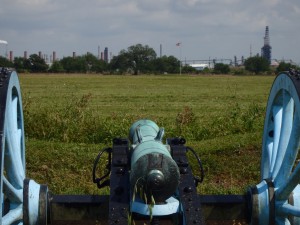A general atmosphere of dereliction seems to be the Chalmette Battlefield’s way of confessing that it merits only a cursory visit; and I did not give it more. A cracked pavement circles an irregularly mowed field, with faded placards indicating the positions and movements of troops during the battle; atop a rampart sat a few cannons pointed at the refineries of Chalmette. I was the only visitor, and I went from placard to placard on my bicycle.
The victory, in 1815, excited a dispirited populace eager for some kind of national triumph over foe which had marched on Washington and burned the Capitol and White House; and enthusiasm lasted as long as America had few other victories over foreign foes; but today we mostly see the Battle of New Orleans as a slender and purposeless success. A peace treaty had already been signed ending the war, but since it was signed in Ghent, it took months for word to reach the Americas. The victory is said to have been caused by British braggadocio more than American virtue; the legend – and for all I know the truth of the matter – is that British officers contemned the ragtag army of their former colony, and executed their battle plan with an absolute minimum of generalship. The commanding officer did not attack the American army as it arrived, but rather waited until it had built entrenchments; ladders for crossing the trenches were acquired but not brought to the actual battle by the officer responsible for them; British officers ordered their men to charge the trench, in the teeth of cannons and muskets, to no evident purpose. By the end of the day the British had 2,000 casualties and the Americans 70.
Dumb charges are one of the themes of British military history, and the British seem very nearly to take pride in them; I suppose this mental peculiarity helped keep the British rich from the scaffold and guillotine. This particular dumb charge may have served some purpose, to curb British imperial designs for a week or so, or help convince the British to stick to the treaty they had signed; but sometimes it is hard not to think of how sad it is that human lives are thus squandered by the stupidity of their so-called superiors.
Some Americans also regret this battle because they say it gave us one of our worst presidents, Andrew Jackson. I spoke with someone recently who said that there were two presidents he really hated, admiration for whom always irked him: Woodrow Wilson, and Andrew Jackson. Jackson certainly gained great popularity from his victory in this battle. I am personally more inclined to think that he would have found some other way to become president. The country was not just a seaboard of thoughtful farmers and tradesmen anymore: the backwoods pioneers had become a major element of the nation, and it was time for one of them to become president. And the main accusation leveled against Jackson is not that he was a boor, but that he ordered America’s “final solution” for the Native Americans, deporting almost all to the West via the Trail of Tears. What Jackson did at a stroke the nation seemed bent on doing slowly anyway.
So I confess I do not know if the course of history would have been any different had that battle turned out otherwise; I am inclined to think that the place’s current desolation seems to indicate that we do not feel any special significance in the place. I think Jackson himself has similarly lost his significance in our national consciousness; he sits there in Jackson Square in New Orleans but I do not know if anyone really cares that he does; I think if a concerted effort to unseat him from the twenty dollar bill were attempted, say by Native American groups, I think they would succeed. I would not mind such a thing, only I would return to our old custom of putting the bust of Freedom on our money, rather than swamp Jackson’s imago with another of our Caesars.

One Comment